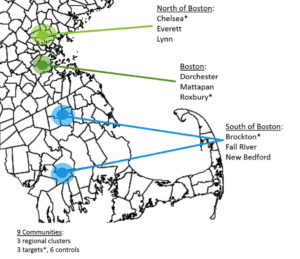What comes to mind when you think about health?
The neighborhood you live in rarely makes the list. However, research shows that the places we all live work, play, grow, and learn matter more for good health than access to health care and genetics combined.
A new wave of development is sweeping cities in the Boston metro area. Using this development to transform neighborhoods presents one of the most significant opportunities of our time to improve the health of thousands of New Englanders.
The relationship between housing and health is complex. Understanding how to build neighborhoods in a way that improves the health of residents is at the heart of the Healthy Neighborhoods Study. With funding from the Robert Wood Johnson Foundation, CLF and the Massachusetts Institute of Technology Department of Urban Studies and Planning partnered with nine Massachusetts communities to explore how new developments change neighborhood conditions, and how those changes impact the health and well-being of the people living there.
The nine partner communities are struggling with health and economic growth but are also likely to experience a wave of new development in the near future. This expected growth presents the opportunity to learn how development, when done well, can create healthier neighborhoods and healthier people.
Learn more below.
Development Drives Good Health
Transit-Oriented Development
One of the most critical aspects of the Healthy Neighborhoods Study is understanding the impact and effectiveness of mixed-use Transit-Oriented Development. This type of development combines high-density housing with commercial, retail, or green space within a 30-minute walk of public transportation. When designed for people with a wide range of incomes, these types of development projects can be powerful vehicles to deliver good health.
Healthy Neighborhoods Equity Fund
Creating these kinds of development opportunities is the focus of CLF’s Healthy Neighborhoods Equity Fund, a multi-million-dollar private equity fund developed in partnership with the Massachusetts Housing Investment Corporation to invest in building healthy communities
Since its launch in 2014, this groundbreaking Fund has helped to bring $18 million in financing to support six development projects in the Greater Boston area – three of which are in communities currently in the research study. CLF is using what we learn from the Healthy Neighborhoods Study to improve the impact of the Fund.
About the Study
Community First
We believe that the people most impacted by a problem have unique insights and are in the best position to solve it. That’s why the Healthy Neighborhoods Study is being done in partnership with 45 local residents and nine community organizations that are leading work on the frontlines for environmental justice, housing justice, equitable development, and community health. Together, our research network is collecting on-the-ground data with nearly 1,000 local residents a year to determine what matters most for health in their communities. We use these resident insights to work with local, state, and regional planning, development, and health partners to find new ways to build healthy communities.
The partners are repeating the research study every year for the next several years. Community partners will continue to refine the surveys to focus on issues they are working to address locally. Researchers and community members alike work together to use this data to build solutions that meet their community’s development needs and priorities.
Our Research in Action
Applying What We’ve Learned
Already the findings are being applied in numerous ways. At CLF, we are using what we learn to improve and replicate the Healthy Neighborhoods Equity Fund. The Fund serves as a model for how to address the challenges of building healthy neighborhoods nationwide.
Back at home, community partners are using the data to shape conversations with local politicians, developers, and residents and to advocate for more equitable housing developments. And nationally, researchers from across the country are drawing from this study’s unique perspective for urban development data, or as a template for their own research.
Stories from the Field
Read how our community partners are turning research into action.
Our researchers are local residents who have taken the lead on the Healthy Neighborhoods Study in their communities.
Interviews:
Andrew, our graduate fellow from MIT, talks about how to design a research study both with and for residents.
Ronel, a Resident Researcher and housing justice organizer from Brockton, believes his community is strengthened when locals are the ones conducting community research.
Adela, a Resident Researcher, organizer, and college student, shares her unique perspective as a researcher.
Read all of our interviews with residents and partners here.
Communities and Partners
The Healthy Neighborhoods Study focuses on nine communities divided into three areas: one north of Boston, one in Greater Boston, and a third south of Boston. One neighborhood within each area is the target of the Healthy Neighborhoods Equity Fund. The communities were chosen because, although they all face varying levels of economic and health disparities, each shows the promise of a wave of new development in the near future.
Communities
North of Boston:
Chelsea*
Everett
Lynn
Boston:
Roxbury*
Dorchester
Mattapan
South of Boston:
Brockton*
Fall River
New Bedford
Each member of this research network brings their own unique experience, expertise, and voice to identify, measure, and address the development challenges facing their communities.
*This community is a target of the Healthy Neighborhoods Equity Fund.
Our Partners
Metropolitan Area Planning Council
Massachusetts Department of Public Health
Massachusetts Institute of Technology Department of Urban Studies and Planning
T.H. Chan Harvard School of Public Health Department of Health Policy and Management
Urban Imprint Inc.
Dudley Street Neighborhood Initiative
Codman Square Neighborhood Development Corporation
Lynn United for Change
Alternatives for Community and Environment
City Life. Vida Urbana
Voices for a Healthy South Coast/SouthCoast YMCA
GreenRoots
Mattapan Food and Fitness Coalition
Groundwork Southcoast
Greater Fall River Partners for a Healthier Community
Made possible by the generous support of the Robert Wood Johnson Foundation
To get involved with this ongoing research study, please contact us at research@clf.org.


